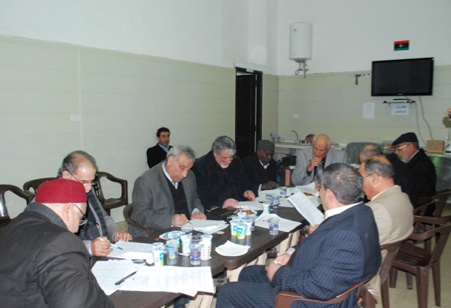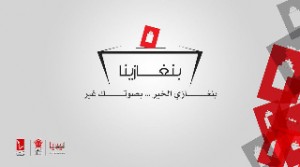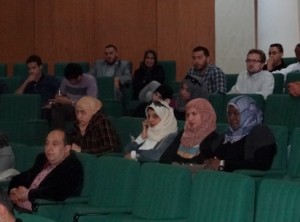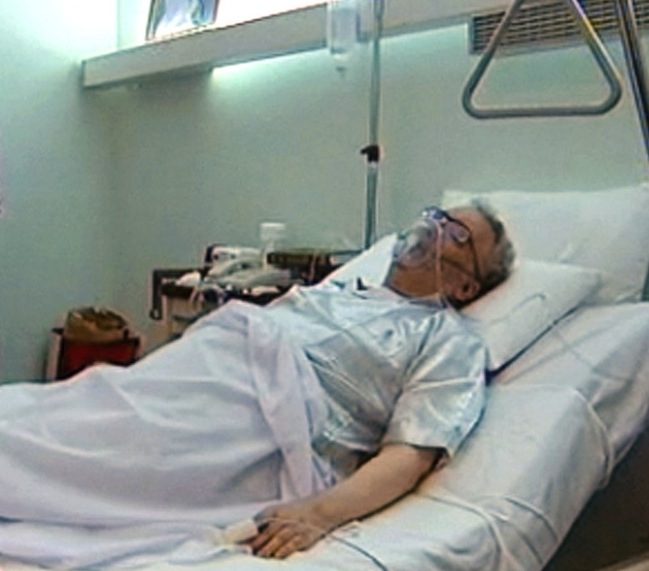By Sharon Lynch
18 April:
Suleiman Zubi, the retired Benghazi court judge who is overseeing the Benghazi local election, has extended the voter . . .[restrict]registration period to 26 April. The last three days of registration saw a dramatic upsurge in the number of voters registering, with the count at the end of the day on Monday well over 100,000. This number is expected to double over the next few days after the candidates names are announced. As of the end of the day on Tuesday, over 100 candidates had filed application to run for office with the High Election Committee.
When Judge Zubi and I first spoke last month, he and his team of hundreds of volunteers were preparing to register 500,000 voters, about 77 percent of the estimated 650,000 Benghazi residents considered eligible to vote. This ambitious target includes Benghazi residents 18 years of age and older.
Benghazi’s total population is an elusive number given that the last census taken in 2006 is not considered reliable. Depending on the source consulted, citations range from a low of 800,000 to a high of 1.2 million. Extrapolating a firm estimate of eligible voters has been further complicated by the NTC’s recent decision to reduce the Benghazi boundaries to exclude the outlying Sidi Khalifa, Benina, and Terria districts. However, it seems reasonable to extrapolate that the 100,000 voters registered between 4 April, when registration opened, and yesterday represent about 25-30 percent of the anticipated total to be registered.
The Benghazi High Election Committee received its mandate to organize the elections from civil society organizations, committees of Benghazi thuwar, the “Benghazi street,” and the Local Council. After several long meetings with various sectors of society, Zubi assembled a committee of former colleagues (also retired judges) to determine the principal regulations and process for the election.
After more than 43years with no elections, Zubi described the committee as essentially building from scratch. They looked to the Misrata election, international democracies, and elections held under King Idris as models. Ideas were discussed with Benghazi youth, civil society organizations and Wisemen committees and, through a collaborative process, they developed the Benghazi election plan.
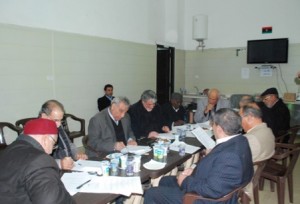
Consultations were held with international organisations and governments and the United Nations. International NGOs provided assistance in developing training programs for voter registration and election monitors.
The city was divided into eleven election districts. Spread throughout these districts are 115 voting centers located in schools and community centers where volunteers are standing by, eager to process registration forms. Anyone over 18 who can prove Benghazi residency by presenting a Family Book plus a passport or identification card is eligible to register to vote.
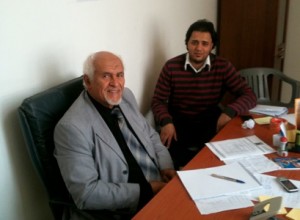
When asked about the possibility of fraud associated with the use of the Family Books, Zubi was not concerned. He explained that the registration centres are located in neighbourhoods where voters live and are run by volunteers from those neighbourhoods, who will recognise those registering to vote by face and name. Registration will be limited to those who hold Family Books from Benghazi, eliminating the many refugees from other parts of Libya who have moved to Benghazi during the last year.
Part of the election committee’s plan to encourage Benghazi residents to register to vote included commissioning and distributing posters designed to both motivate and educate potential voters to register to vote and get involved in the election. Two clever designs are shown below.
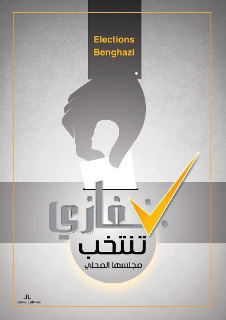
A more aggressive grassroots “Get out the Vote” campaign sprang into action in Benghazi on Monday morning when young election volunteers took to the streets with bullhorns. Cars were also seen displaying banners urging residents to register to vote.
Just-registered voter Ahmed Senalia celebrated by tweeting a photo of his registration certificate and asking others to honor the revolution by joining him, “I registered to vote in #Benghazi local elections, did you? Revolution happened so that your voice counts. #Libya”.
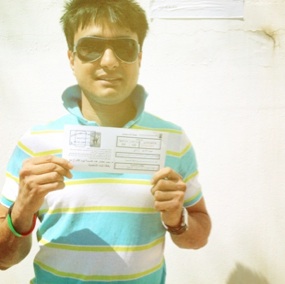
Benghazi voters will elect 41 council members. According to Zubi, the plan is for 11 of the 41 to represent Benghazi on the National Transitional Council. Between 15th and 17th April, candidates wishing to run for office will file candidacy with the Benghazi election committee. Each candidate will be required to prove that s/he is at least 25 years old and “clean,” in other words free of association with the Qaddafi regime. Following the procedure used in Misrata, each candidate must ask twenty people to come before the election committee and, swearing an oath on the Quran, endorse his or her candidacy.
On the 19thApril, a list of names of those running for office will be announced to the public and published on the Benghazi election website (http://www.lecbly.com). The citizens of Benghazi will then have three days to present objections to the elections committee regarding candidates’ suitability.
Candidates who are approved to run will have ten days to campaign. Zubi plans to arrange with the media, either television or radio, for each candidate to have equal time to present his/her qualifications and positions on air.
When asked about campaign finance regulations, Zubi was adamant that no funds from those connected with the Qaddafi regime or from outside of Libya would be allowed. In contrast to the Tripoli election committee, whose chairman, Salah Adden Tabagh, told Libya Herald reporter Umar Khan that the Tripoli Local Council election process will not impose financial regulations on campaigns, in Benghazi a spending ceiling will be established to ensure that candidates of different income levels will be able to compete on equal terms. Additionally, prior to the election, each Benghazi candidate will be required to provide an accounting of how much was received in donations, from whom, and how the funds were spent.
The Benghazi High Election committee has estimated that it will cost LD 700,000 to conduct the elections. It is being funded by the Benghazi Local Council and has spent LD 300,000 to date.
Having observed marked differences in the level of transparency in Misrata and Tripoli election planning, I wondered what role it would play in Benghazi’s election. The transparency built into the planning and execution in Misrata was essential to the overwhelming success and legitimacy of the election there in eyes of the community. Would Zubi’s committee follow Mohamed Berween’s lead to incorporate full transparency, or the opaque Tripoli process where frustrated Tripoli residents are guessing at what is happening with elections, asking Tripoli Local Council leaders for information and receiving few answers?
Similar to how all of Misrata’s election planning meetings were open to the public, Zubi shared how the Benghazi election committee had invited the public to participate in its meetings and worked to establish a dialogue from the outset. He is shown below discussing the elections with Benghazi residents:
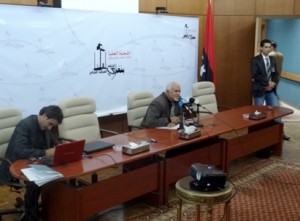
Additional information about the Benghazi election can be found on the official website http://www.lecbly.com or on its Facebook page http://www.facebook.com/BenghaziElections.
A firm timetable has not yet been determined for Benghazi’s official election day. At the time Zubi and I spoke in March, he was waiting to hear from European Union organisations that had volunteered to provide ballot boxes and ink, and anticipated that the official election day would likely be scheduled for early May.
Stay tuned to this space for updates on registration results, candidates running for office, and election day notices.
Sharon Lynch can be fund at: twitter.com/sharon_lynch
Tweet
[/restrict]


